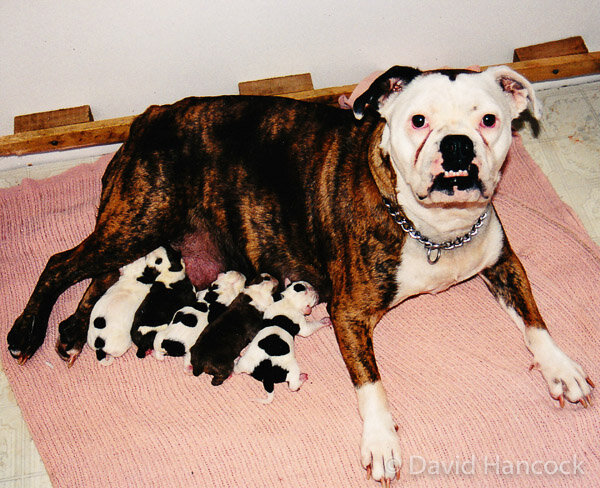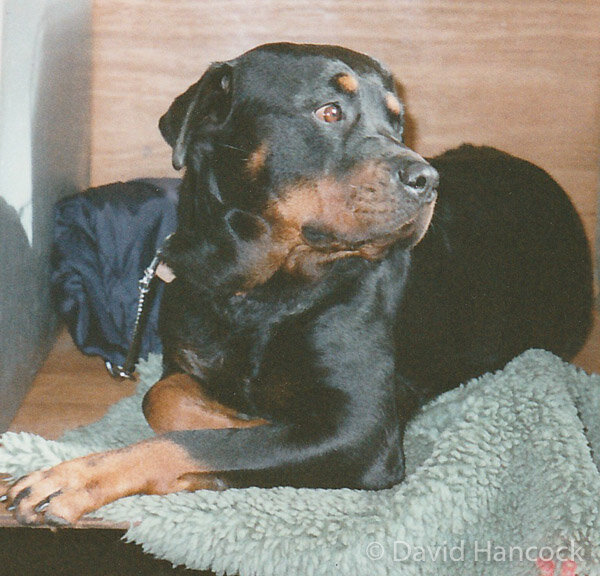1150
PAYING FOR CRUFTS
By David Hancock
The best part of 100,000 dogs are bred every year on licensed puppy-farms. These farms cater for the demand for pedigree dogs, especially those breeds paraded each year at Crufts and promoted by the breed clubs. There are around 900 licensed dog breeders in Great Britain. This represented an increase of more than 30% in just ten years. Puppy farming is increasing, often being encouraged in some areas by the pursuit of business taxes. Nearly half of these breeders were located in well under 10% of our local authorities. South-West Wales is the puppy-farming centre of Britain: over 80 in Carmarthenshire, just over 40 in Ceredigion. Around 14,000 breeding bitches are utilised by licensed breeders in Britain; on an average litter size of 5, this represents over 67,000 puppies a year. This however assumes breeder-honesty in their returns and that each bitch is only bred from once a year. One licensed breeder has 200 breeding bitches; this is blatant and brazen puppy-farming. The annual breeders' licence fee varies from just over £20 to over £740 (in London). Just how many puppy-farms would there be in South-West Wales if the licence fee were say £1000 a year? Who picks up the tab for unwanted or stray dogs? Never the breeder! This may be hidden from tax-payers but is it morally tolerable on any grounds? Where is the high-profile campaign by the usually verbose RSPCA against such dog-abuse? And it's mainly a pedigree breed problem too. Where is the Kennel Club, which registers pedigree pups, for a fee? Crufts may be their flagship but condoning bad breeding is their legacy.
A few decades ago, a retriever breeder handed over 160 dogs to the RSPCA but retained around 40 bitches, for breeding. Just how many litters have these 40 produced and how many has the KC registered since then? It is quite clear to me that far too many pedigree dog breeders are overproducing, breeding too many pups. Good news for the KC's bank balance, not good news for the breeds concerned, bad news for those seeking responsible dog breeding and very bad news indeed for the hard-pressed rescue organisations. In my view, it should not be easy to buy a pedigree puppy, otherwise the purchase is not valued, not made special, degraded in fact. Crufts advertises pedigree breeds; Crufts is financed by puppy-farmers!
What do breed correspondents have to say about such matters? Here are some of their comments in recent years: Pembrokeshire Welsh Corgis - "...five bitches produced five litters apiece, three of whom had produced their fourth litter less than seven months previously...one was only three years eight months (old). Five litters before her fourth birthday!" Staffordshire Bull Terriers - "...12 bitches having had seven litters. 1 had 10 or more litters." Airedale Terrier rescue - "...as fast as one is rehomed others are brought to our attention." Rhodesian Ridgebacks -- "The horrific fact is that too many Ridgebacks are being bred." St Bernards -- "200 Saints had been rehomed in two years". Dalmatians - "...one bitch, had four litters of 33 puppies in under four years." And Weimaraners - "The number of dogs needing to be rehoused also increases every year." Any honourable organization would be shamed by such remarks, by officials appointed by them, on such alarming experiences in the pedigree dog world. The KC runs this world!
These words refer to pedigree show dog breeders not puppy farm owners. According to the KC stud books, in the ten years 1993-2003, over 350,000 Labradors, 150,000 Golden Retrievers, 50,000 Rottweilers, 180,000 German Shepherd Dogs and 30,000 Dobermanns were registered. Even twenty years ago over 1,500 German Shepherd Dogs and 650 Dobermanns were being received annually at the Battersea Dogs Home; only 330 being claimed. The home handles over 1,000 Staffies each year. Boxer rescue rehomes over 1,000 Boxers every year. I dread to think what the totals across the country's breed welfare units as a whole are. Breeding on such a scale is completely irresponsible; it is small wonder that we are being advised to go to such breeders, how else can they shift their stock!
The Kennel Club runs a puppy sales register. In 1996, 92 breeders registered around 3,100 litters; two years later it was 140 breeders producing nearly 4,500 litters. That's an awful lot of stock and that is some increase. Most of these dogs would have been bred from as sires and dams. The reckless breeding of French Bulldogs and Pugs in the last five years, and their KC registration, has led to a whole new market, often in under-age pups and sometimes at motorway carparks, through ruthless breeding and entirely thoughtless buying by a guileless public – who, sadly, often buy dogs paraded by ‘celebrities’. We never learn of the outcome of so many of these waifs. But we do learn of some legal outcomes.
What do reports from the magistrates' courts and the KC disciplinary hearings tell us about some of the very people we are being advised to go to for our next pup? Court cases in recent years involving pedigree dog breeders include: the starvation of 3 Borzois; causing suffering to 94 dogs; Pointer breeder on 35 counts of causing unnecessary cruelty; Akita breeder sold puppy infected with leptospirosis; 'top breeder' of Cocker Spaniels caused appalling suffering to 7 dogs; wantonly causing suffering to 34 Chihuahuas, 2 Chinese Crested and a Yorkie; forging hip-scores for a Labrador; causing unnecessary suffering to a Scottish Terrier which had been kept in a four feet by two feet enclosure; interfering with a badger sett; breeding and selling dangerous dogs; selling mongrels as GSDs; organising dogfights and assaulting fellow exhibitors.
Or, a cynic might add, are we being advised to go to show breeders such as the one whose Poodle gave birth at a show, the one whose dogs died in an overheated car at a show and the ones who have poisoned other exhibits at shows in recent years? Every group of humans contains bad elements but is it responsible advice to tell the public where to go for their next purchase, as the KC do, in the light of such cases? Instead of an all-embracing wave of approval for all breeder-exhibitors, why not build in some checks and safeguards? Every new owner of a pedigree pup, on paying to register the animal in his or her name, should be given the opportunity to comment on the condition of the breeding establishment and on how the sale was conducted. Even the manufacturer of my car does this! Are cars more important than dogs?
The Kennel Club does run a "Puppy Sales Register", with an information pack for prospective puppy owners "where the enquirer is seeking to contact a responsible breeder..." I think they mean any breeder who registers dogs with them -- and we know what some of those are like! The KC's Assured Breeder Scheme asks breeders to follow their policy on the number and frequency of litters and I give them full marks for that. But firstly, why should a puppy-farming breeder even contemplate signing up to such a code? And secondly, in a hard-pressed registration department, busy securing the financial basis of the club's activities, identifying over-breeding is an additional task not a primary one.
What are other countries doing? In Switzerland, a dog cannot be used for breeding unless it passes tests for conformation, temperament and health. In Finland, each breed organisation is required to compile a breeding programme covering character, health, performance and appearance. South Africa has introduced a requirement for hip dysplasia clearance for dogs of all breeds. In Sweden, a litter is registered when the parents meet specified criteria; if they do not, the litter cannot be recognised.
Colombia and Poland accept that mandatory clearances are not popular with breeders but give them no choice. Mexico, Croatia, even El Salvador and the Slovenkia Kennel Club have clearance requirements. The Canadian KC Strategic Planning Committee has looked at the possibility of establishing an advanced registry of pedigree dog breeders. This involves hip scoring, blood sampling, temperament testing, structural soundness, genetic health surveys and progeny tests. As for us, let's muddle on, producing as many litters as we can, from mediocre unhealthy dogs (how can we tell if they are not?), sometimes in quite dreadful living conditions. We are now surely fast becoming a 'Third World country' in the breeding of pedigree dogs. Our precious breeds of dog deserve better. Crufts produces essential KC income - but it's pedigree dogs that pay the price. It’s about time that the fawning, worse than superficial TV coverage of Crufts reveals the cost to dogs of such a breeder shop-window and brings desperately-needed morality into the blighted world of the pedigree dog and the punishment bestowed on dogs through such a widely-covered show-case. Paradoxically, one way to promote the ill-treatment of dogs is to pay your admission-fee at Crufts!












